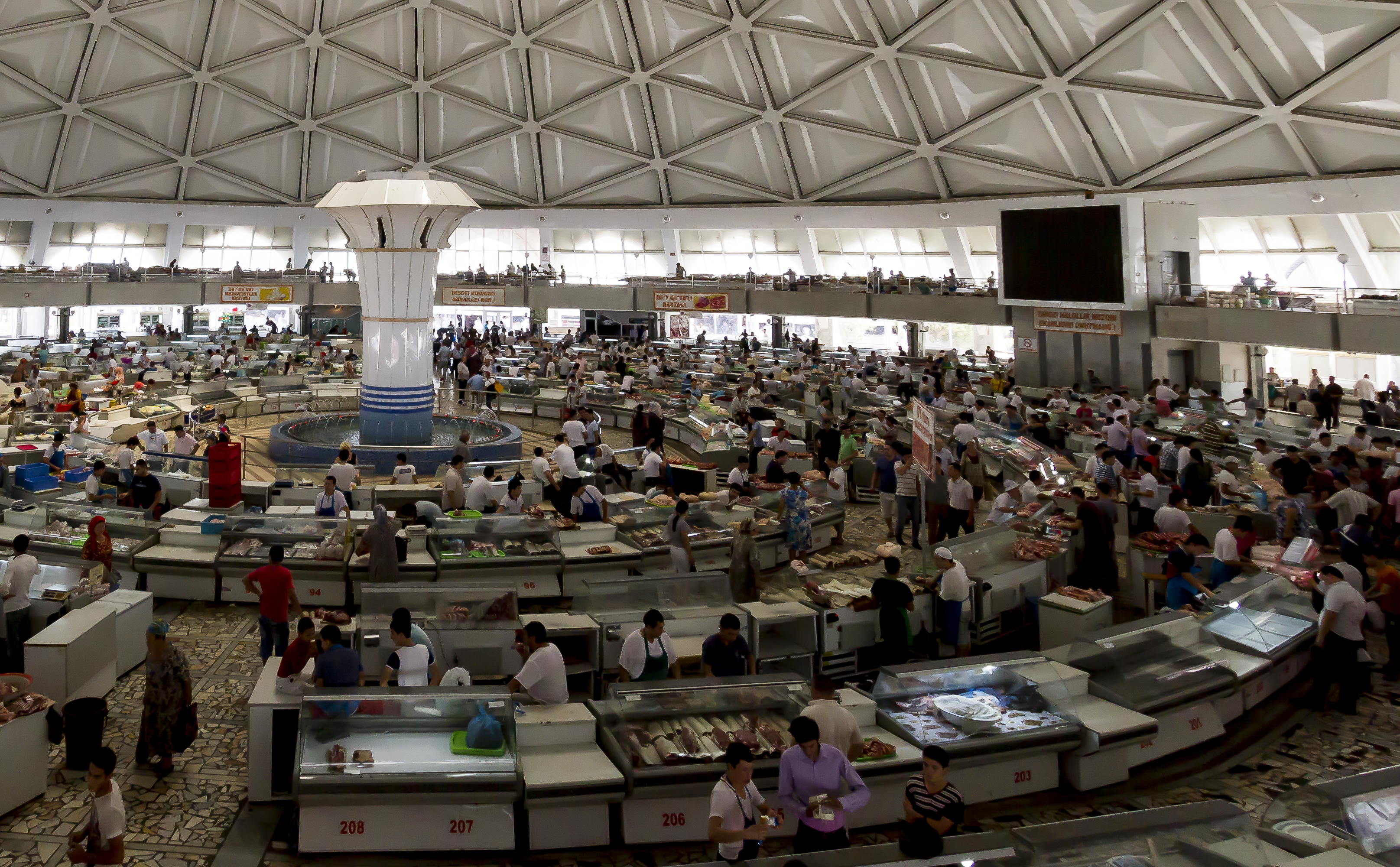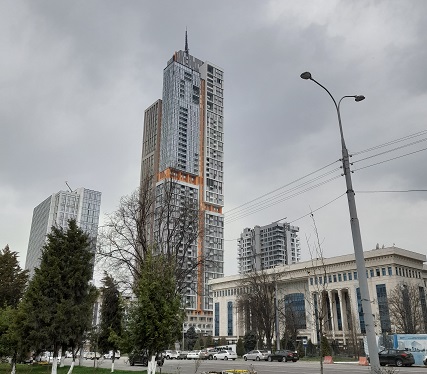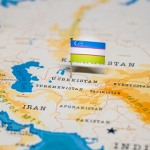Uzbekistan is uniquely located – at the crossroads of South, East, West and Central Asia and Russia. Its future lies in leveraging this strategic positioning and balancing competing geopolitical interests, especially under the recent changed regional circumstances. Tashkent is handling these divergent pulls well, helped by a pragmatic populace which sees the merit in maintaining friendly ties with all major powers.
Four countries have a significant stake in Uzbekistan managing this balance well – the U.S., Russia, India, and China, all of which have a notable presence in the country, although their influence in various areas differs greatly.
The U.S. is associated with the good life – and getting a visa. Standing out among poetry collections and religious texts in bookshops near the 16th century Chorsu Bazaar in Tashkent, are International English Language Testing or IELTS books. In Uzbekistan, where almost the entire educated population spoke fluent Russian just three decades ago, there is a craze to learn and master English. For many of its youth, the U.S. seems to be a dream destination for work, higher studies or even business and leisure travel. The dream is unrealised for this Central Asian country has among the highest visa rejection rates for U.S. visas in the world. In 2020, 74.14% of applications for B visas (business or tourism) from Uzbekistan were rejected.[1]

Despite this seemingly unfriendly visa policy, Washington is now looking to build and cultivate relations with Tashkent. The latest indication of this was U.S. Secretary of State Anthony Blinken’s visit[2] to the Uzbek capital in March 2023, where he commended the benefits of the U.S.’ $25 million invested in English education that country since 2018. He also praised Uzbek President Shavkat Mirziyoyev for labour reform and aid to Afghanistan, especially for girls and women.[3]
But U.S. investment isn’t much. Since 1992, Washington has provided[4] just $1.8 billion in foreign assistance to Uzbekistan. Bilateral trade is also relatively low at $426.4 million in 2021. In contrast, Uzbekistan’s bilateral trade with Russia was $7 billion in the first 10 months of 2022. Still, a convergence of interests in Afghanistan means diplomatic engagement is likely to increase between the countries.
Tashkent tries its best to balance its relationship with the U.S. and Russia. It is a member of NATO’s Partnership for Peace Program and has stayed away from the Collective Security Treaty Organisation (CSTO), a military alliance that comprises of its neighbours Tajikistan, Kyrgyzstan, and Kazakhstan, along with Belarus, Armenia, and Russia. But it is a founder-member of the Shanghai Cooperation Organization (SCO) which is viewed as a counter to Western dominance.
Russia is its traditional partner. The Russian language is widely spoken in cities across Uzbekistan and enjoys a special status in the country. For example, while Uzbek is the only official language in the country, Article 12 of the Law of the Official Language in Uzbekistan[5] states the following: “Under the request of citizens, the text of a document compiled by state notary or person acting as a notary shall be issued in Russian, and if possible in another acceptable language.”
Russian is the lingua franca for use in communication between Uzbekistan and its former Soviet neighbours. Visitors can freely use Russian with a variety of officials from immigration officers to police personnel to banks, the railways and post offices. Efforts made by foreigners from non-Russian speaking countries to speak Russian are appreciated and seen as a mark of a good education.
Uzbekistan has stayed away from full membership of the Eurasian Economic Union (EAEU), which comprises Russia, Belarus, Kazakhstan, Kyrgyzstan, and Armenia, but maintains observer status. This policy has critics within the country, as many Uzbek working class migrants continue to seek their fortunes in Russia. According to figures from the lower house of the Russian parliament[6], 2 million Uzbeks were working in Russia as of November 2022. Membership in the EAEU would enable Uzbek citizens to move with ease to Russia and live and work in the country, but joining the economic bloc will be seen as Tashkent moving into Moscow’s geopolitical camp. Nonetheless, even without the membership, there are opportunities for Uzbeks in Russia and increasing efforts among rural Uzbeks to learn Russian.

India is an old friend to Uzbekistan, but now must turn a new page in the bilateral and step up investment. Indians are welcome in Uzbekistan, which offers a simple e-visa for business visitors and tourists.
Hindi cinema, the perennial Soviet-era favourite, has not penetrated the cultural scene as much in today’s Uzbekistan. But Indian actors like Shahrukh Khan enjoy immense popularity. Newer Hindi films Pathaan are popular, and dubbed or subtitled in Uzbek, and Hindi film and dance music are still played in weddings and in television serials. An ordinary Indian visitor to Uzbekistan is likely to attract curiosity and attention from locals who have a soft corner for Indian culture. Many have spoken of being recipients of warm hospitality from strangers. There is no Indian media presence in Uzbekistan, so global media coverage on India becomes the point of information. Consequently, the better-informed Uzbek is likely to ask about the relationship between Hindus and Muslims in India.
India-Uzbekistan trade is only slightly higher than the Uzbek-U.S. bilateral at $442 million[7] in 2022 and the potential is high and under-utilised. Pharma is a big export from India but the recent linking[8] of 20 deaths of children in Uzbekistan to cough syrups produced in India has put pressure on the Uzbek authorities to enforce stricter standards on pharmaceutical imports from India.

Political and strategic relations are strong as ever. Indian Prime Minister Narendra Modi’s visit for the 2022 SCO Council of Heads of State Meeting in Samarkand, was well received. The countries share common concerns in Afghanistan and have a biennial military exercise termed the DUSTLIK, most recently held in March 2023.
In a country where headscarves are hardly visible on the streets of big cities, the developments in neighbouring Afghanistan are keenly watched by the Uzbek public. Pilgrims from Uzbekistan regularly travel to Mazar-i-Sharif in Afghanistan’s Balkh Province. It is widely believed that many members of the erstwhile government in Afghanistan fled to Uzbekistan, but there is little public information about their whereabouts, even as Tashkent seeks some sort of engagement with the Talban.
Uzbek President Mirziyoyev has followed in the footsteps of his predecessor Islam Karimov when it comes to engagement with China. Beijing already plays a very important economic role in his country, although the Chinese presence is not apparent in Uzbek cities. Bilateral trade between the countries is estimated[9] to have crossed the $10 billion mark in 2022. Uzbekistan is seen as an essential cog in China’s Belt and Road initiative. When visiting Samarkand for the 2022 SCO Summit, Chinese President Xi Jinping spoke of his country’s ambitious projects, from the China-Central Asia natural gas pipeline to the China-Kyrgyzstan-Uzbekistan highway and railway, which, he said, was transforming Uzbekistan from a “land-locked country to a land-linked country.”[10]
The Uzbeks, however, don’t want to take sides. They are eager to maintain friendly relations with everyone and keep geopolitical power games at a distance. It has enabled them, so far, to keep focused on their many developmental goals. An independent foreign policy, where the country maintains friendly ties with East, West and the Global South, is its goal. So far, this fine balance has been achievable.
Ajay Kamalakaran is a writer with a special interest in Russia and the former Soviet Union.
The personal insights provided in this article were based on his trip to Uzbekistan in March 2023.
This article was exclusively written for Gateway House: Indian Council on Global Relations. You can read more exclusive content here
For permission to republish, please contact outreach@gatewayhouse.in
©Copyright 2023 Gateway House: Indian Council on Global Relations. All rights reserved. Any unauthorised copying or reproduction is strictly prohibited.
References
[1] U.S. Department of State, Bureau of Consular Affairs, “Adjusted Refusal Rate B-Visa only by Nationality, Fiscal Year 2020,” https://travel.state.gov/content/dam/visas/Statistics/Non-Immigrant-Statistics/RefusalRates/FY20.pdf.
[2] U.S. Department of State, Office of the Spokesperson, “Secretary Blinken’s Meeting with Uzbekistani President Mirziyoyev,” 1 March 2023, https://www.state.gov/secretary-blinkens-meeting-with-uzbekistani-president-mirziyoyev/.
[3] U.S. Department of State, Office of the Spokesperson, “Secretary Anthony J. Blinken at a Press Availability,” 1 March 2023, https://www.state.gov/secretary-antony-j-blinken-at-a-press-availability-29/.
[4] U.S. Department of State, “U.S.-Uzbekistan Relations,” 28 Feb 2023, https://www.state.gov/u-s-uzbekistan-relations/#:~:text=Uzbekistan’s%20trade%20with%20the%20United,Uzbekistan’s%2016th%20largest%20trade%20partner.&text=Since%201992%2C%20the%20U.S.%20has,in%20foreign%20assistance%20to%20Uzbekistan.
[5] “Law of the Republic of Uzbekistan “On Official Language”,” UNHCR Refworld. https://www.justice.gov/sites/default/files/eoir/legacy/2013/11/08/Law_on_official_language.pdf.
[6] “The State Duma disclosed the number of migrants from Uzbekistan working in Russia,” DumaTV, 29 Nov 2022, https://dumatv.ru/news/v-gosdume-raskrili-chislo-rabotayuschih-v-rossii-migrantov-iz-uzbekistana.
[7] “India-Uzbekistan Relations,” Embassy of India, Tashkent, https://eoi.gov.in/tashkent/?2615?000.
[8] “Medical Product Alert N°1/2023: Substandard (contaminated) liquid dosage medicines,” World Health Organization, 11 Jan 2023, https://www.who.int/news/item/11-01-2023-medical-product-alert-n-1-2023-substandard-(contaminated)-liquid-dosage-medicines.
[9] Ministry of Foreign Affairs of the People’s Republic of China, “Working Together for a Brighter Future of China-Uzbekistan Relations,” 13 Sept 2022, https://www.fmprc.gov.cn/mfa_eng/wjdt_665385/zyjh_665391/202209/t20220913_10765712.html.
[10] Ibid.


